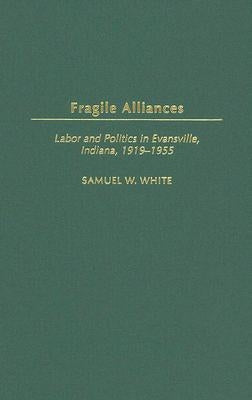Bloomsbury Publishing PLC
Fragile Alliances: Labor and Politics in Evansville, Indiana, 1919-1955
Fragile Alliances: Labor and Politics in Evansville, Indiana, 1919-1955
Couldn't load pickup availability
How did the alliance between labor and the Democratic Party develop after the First World War? What role does Evansville play in an examination of this alliance? What was the impact of the alliance on U.S politics and society? These are some of the questions that Samuel W. White tackles in his book Fragile Alliances: Labor and Politics in Evansville, Indiana, 1919-1955.
Focusing on Evansville, Indiana, as a case study, White challenges traditional assumptions in the field, such as the following: labor has one political voice; labor is monolithic in electoral politics; the New Deal successfully reordered American society and politics. White examines the roles played by political repression, opposition by employers, and anticommunist forces within the community as well as the labor movement in undermining the labor-Democratic Party alliance in Evansville. He contends that by the 1950s, the impact of these forces blunted the potential of the labor movement and the Democratic Party to transform the political system by giving workers and their allies a permanent political space in electoral politics. How did the alliance between labor and the Democratic Party develop after the First World War? What role does Evansville play in an examination of this alliance? What was the impact of the alliance on U.S politics and society? These are some of the questions that White tackles in his book Fragile Alliances: Labor and Politics in Evansville, Indiana, 1919-1955. Focusing on Evansville, Indiana, as a case study, White challenges traditional assumptions in the field, such as the following: labor has one political voice; labor is monolithic in electoral politics; the New Deal successfully reordered American society and politics. White examines the roles played by political repression, opposition by employers, and anticommunist forces within the community as well as the labor movement in undermining the labor-Democratic Party alliance in Evansville. He contends that by the 1950s, the impact of these forces blunted the potential of the labor movement and the Democratic Party to transform the political system by giving workers and their allies a permanent political space in electoral politics. Much of the published literature on labor and politics in the U.S. is focused on national events and organizations that make labor appear as a monolith in electoral politics. White diverges from the national focus of the majority of this literature, instead looking at labor and politics at the local level. While much of the published literature argues that the alliance between labor and the Democratic Party in the 1930s was a formidable force that reordered American society and politics, White shows that in Evansville, the alliance was anything but that. Racked by political repression, opposition by employers, and anticommunist forces within the community and the labor movement itself, the alliance was remarkably fragile and incapable of sustaining the momentum it had established in the 1930s.Author: Samuel White
Publisher: Bloomsbury Publishing PLC
Published: 08/01/2005
Pages: 222
Binding Type: Hardcover
Weight: 1.04lbs
Size: 9.30h x 6.44w x 0.93d
ISBN: 9780313321573
About the Author
Samuel W. White is Assistant Professor of Labor Education at the University of Missouri-Columbia. His teaching and research interests include twentieth-century labor history, work organization, and grievance administration. He resides in Columbia with his wife, Sukanya, and children, Jacob and Brishti.
Share


